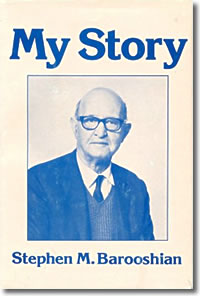Sierra College History
by Stephen M. Barooshian
From his autobiography, My Story (1976)
 The depression had started a large migration from the middle states to California. Hundreds of thousands of families came from the Dust Bowl. The mild California climate softened the pangs of poverty. This sudden growth of population created a critical need for expanded educational facilities. To meet this need, junior colleges were organized in many parts of the state. One of these was Sierra College in Auburn. Students who wanted to receive education beyond the high school level, could complete two years of college work nearer home. I was now transferred from the high school to the junior college.
The depression had started a large migration from the middle states to California. Hundreds of thousands of families came from the Dust Bowl. The mild California climate softened the pangs of poverty. This sudden growth of population created a critical need for expanded educational facilities. To meet this need, junior colleges were organized in many parts of the state. One of these was Sierra College in Auburn. Students who wanted to receive education beyond the high school level, could complete two years of college work nearer home. I was now transferred from the high school to the junior college.
Larger Audiences
This new development pleased me greatly. It had always been my dream to be a lecturer in history. Now I was about to realize the fulfillment of that dream. I liked to lecture to large groups of students. Somehow, my performance as a lecturer seemed to improve in direct proportion to the size of my class. I got a tremendous amount of inspiration from the students facing me. My greatest experience came when as a result of the GI bill extending educational privileges to veterans of the Korean War, the enrollment in our college increased greatly.
One of the requirements of graduation from junior college was a course in American Institutions. I was assigned to teach it. I had over three hundred students in this class. The little theatre was the only building that could accommodate such a large group. I had the unusual and exciting experience of having two students whose fathers also were enrolled in the same course. The administration wanted to install a public address system on the platform. They feared that the students in the rear of the little theatre would have difficulty hearing my voice. I was very much opposed to the idea. I reassured them that no one in the room would have any difficulty to hear me, and I promised I would not shout. I told them when the time arrives for me to use one of those contraptions, it will be time for me to quit. The public address system was not installed, and no one in the room had to cup his ear to hear me, and I assure you, I did not shout. ...
Time to Retire?
I had now served continuously in this wonderful community for over thirty five years, and thought it was time for me to retire. I had been supremely happy in my professional work, and did not want to wait until people would say "why doesn't the old man quit." I wanted to leave at the height of my professional career. I wanted to walk out of my classroom while my gait was firm and my vision clear. My income upon retirement would be ample to take care of our needs. Our tastes were simple, therefore our needs were few. So, I wrote a letter to the president of the college stating my intention to bring to a close my career as a full time teacher upon the termination of the academic year. A few days later I received a letter from him requesting that I be present at the next meeting of the governing board of the college.
There were five members on this board elected by the different sectors in the college district. By a strange coincidence, three of the members were former students of mine. The board wanted to know why I wanted to retire. I said thirty five years was a long time for me to teach, and I repeated my desire to leave while I was still in good physical condition. They expressed complete satisfaction with my work, and urged me to stay a few years longer. And to bolster my spirits, they suggested that I take a year of sabbatical leave. They knew that I needed a change. In all of my thirty five years of teaching, I had missed school only once! A record I don't believe will be easy to break. I was deeply touched by their kind words about my work, and said that I would stay a little longer. …
Retirement
When finally the time arrived to retire, the good people of this community showed their appreciation of my work in many different ways. The governing board of the college conferred the title emeritus on me, the first such honor given a teacher. I was asked to deliver the commencement address that year. A banquet was given in my honor at which several hundred of my former students came from all over the country. My colleagues gave me recordings of some of my favorite operas. I received hundreds of letters and telegrams from students and friends who were unable to attend the banquet in person. I hope the reader will forgive me, a very old man, to feel a bit proud of myself, for reproducing here a letter that appeared in the Auburn Journal sent by one of my students of many years ago, whom I could not remember.
March 14, 1960
Editor - the Auburn Journal:
The news that Mr. Stephen M. Barooshian will soon retire brings back many sweet and exciting memories. What a remarkable teacher this man has been!
It is now more than a quarter of a century since I sat in his class, but the impressions he left on my mind and heart are still as vivid as they were then. There was not a dull moment in his classroom. We eagerly waited for the hour when his class would meet. The events of the past were presented in such a dramatic manner that we actually forgot the present, and were transported into the past. How can anyone forget his description of Napoleon's retreat from Moscow, or the humiliation of Henry VI of Germany at the hands of the Pope of that day?
Are great teachers born or are they the product of training? Mr. Barooshian made us love history. His inspiring method of teaching, mixed with a great deal of exquisite humor, made our daily meetings a delightful experience in learning. I know that all of his former students would like to join me in wishing him many, many more years of good health and happiness.
— C. Hinshaw
I was unable to find this very kind and generous man's address to write him a note of thanks. But if he ever gets a copy of this little book, I want him to know that I was deeply touched by his letter.
